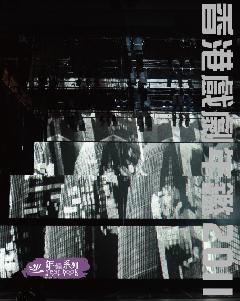American pianist Jeremy Denk performed in HKU on 1st June 2018, with a programme consisting of Mozart, Prokofiev, Beethoven and Schubert, titled as “Notes of Profundity” – which was perhaps an overstatement.
The pianist commenced the concert with Mozart Rondo in A minor, K.511. It was carefully crafted with sufficient dynamic gradations under Denk’s hands, with a sense of melodrama displayed. There was clear delineation of inner voices, such as from bar 31 to 41, and some sense of architecture. However, at times the piece was over-phrased, making it rather fussy and laboured while the simplicity was lost. More importantly, Denk had a habit of “singing” the melody (with right hand) against the ascent and downfall of notes, meaning the often most expressive moments at higher register were played at a lower volume and vice versa. The artificialness in the playing has severely affected the musical outcome, and the emotional intensity throughout the piece remained low, incapable of displaying diverse emotions in the music.
Before playing Prokofiev Visions fugitives, Op. 22, the pianist spoke about the first half of the programme eloquently, introducing the historical background, main features and his key conception of the works; yet, is it really necessary, as programme notes had served the same purpose? In addition, as the old saying goes, music is a universal language that can overcome linguistic and cultural barriers. As a musician (though Mr. Denk himself is a distinguished writer) on stage, perhaps it is more important to be capable of communicating thoughts through music.
Regrettably, Denk failed to pull off a musically persuasive performance of Prokofiev Visions fugitives, Op. 22, a series of vignettes possessing unique characters. The artificiality remained in this work as well, notably in the more lyrical fragments, which were played too gently at times, without taking the dissonance to the fullest. The sarcastic, satirical nature of Prokofiev’s music was lost. The livelier, more thrilling fragments, for instance No.4 (Animato), No.5 (Molto giocoso) and No.10 (Ridicolosamente), suffered from the lack of percussive tone, wide dynamic range and diversified touches. The artistic delivery and audience engagement, here, was ineffective, which was further weakened by the occasional overpedalling. Nevertheless, Denk’s playing was technically assured and benefitted from satisfactory finger control, dexterity and high degree of technical precision, facilitating a fluent flow in No.2 (Andante) and No.19 (Presto agitatissimo e molto accentuato).
The pianist then proceeded to Beethoven Piano Sonata No.30 in E major, Op.109, which Denk gave a more convincing performance. He took the primary theme of the first movement (Vivace ma non troppo – Adagio espressivo) at a relatively brisk pace and the arpeggiated chords had the emotional intensity and sense of drama needed as expressive gestures. Some emphasis was given to the rather sudden modulation to C major. The short chordal section from bar 78 to 85 was treated with legato and good clarity with forward momentum, displaying both vertical and horizontal thinking. Yet, the dynamic range was somewhat limited despite the large body movement, leading to insufficient contrasts and inadequate dynamic layering, such as that in bars 61 to 62 (f and ff). The second movement, Prestissimo, also suffered from insufficient volume, especially as ff was marked. The counterpoints were, however, delivered with much clarity, and the playfulness and excitement was captured successfully in this movement.
On the contrary, Denk’s interpretation of the third movement, Gesangvoll, mit innigster Empfindung, was musically less persuasive. The theme was performed calmly with serenity, with some well-controlled voicing, but the underlying waltz-like rhythm in Variation 1 was lost. In Variation 2, the contrapuntal texture was handled appropriately, such as from bar 41 to 44. However, the moving moments in the variation (like bars 45-48, 61-64) were ruined by the pianist’s overly light, detached touch. The clarity in Variation 3, which also contained contrapuntal writing, was hampered by the overuse of damper pedal, despite the evident rhythmic drive. Variation 4, again, lacked naturalness and direct expression of emotions, while the pianist attempted to explore different tonal colours; and some luscious moments were missed, failing to bring the music to higher emotional intensity. For example, the surge of emotions from bar 106 to 109 was unfortunately not displayed. In the fugue-like Variation 5, Denk’s playing had impassioned rigour, but individual voices were blurred due to overpedalling. As the music prepares itself for climax in Variation 6, there was continuous noise due to the resonance of the microphone (the pianist placed it near the piano), which was indeed quite distracting. Moreover, as the pianist failed to create sufficient volume, the climax at Variation 6 was much less powerful than expected.
After the intermission, the pianist went on introducing Schubert’s last piano sonata – Piano Sonata in B-flat major, D.960, discussing the stylistic features of this sonata, Schubert’s biography and the variety of emotions displayed. The first theme in the first movement, Molto moderato, was played with well-controlled tone production, but the shaping of thematic materials was lacking. The symbolic meaning of the trills in the bass as a call of death, which the pianist also mentioned, was conveyed in his playing, but the ever-changing emotional world of Schubert – warmth, tranquillity, anxiety, remorse, hopelessness – represented by the changing tonalities was not always evident. Denk still had the tendency to “sing” against the natural direction of notes here.
The pianist then gave a more convincing account of the second movement, Andante sostenuto, with a greater sense of engagement. In fact, it seemed that throughout the concert, this was the only moment that the pianist delivered his thoughts effectively without some kind of artificial barrier. There was a good use of silence to create suspense and tension in the music, and the central section was performed with optimism leaked out from bleakness. The very unexpected modulation to the remote C major was handled carefully, expressing a sudden gleam of hope. When returning to its home key (C-sharp minor), the desolation and somberness was captured successfully, in its integrity of pulse and sense of contrast. The intertwining of major and minor keys in the coda of the movement was particularly impressive.
When it came to the third movement, Scherzo (Allegro vivace con delicatezza) – Trio, it was played at an unnecessarily fast tempo, though some elegance and delicacy was displayed. Occasionally, the left hand overpowered the right hand, even when the left-hand part only served as accompaniment.
The theme of the fourth movement, marked Allegro ma non troppo, was phrased with excessive rubato and unnecessarily detached articulation, rendering the mood as childish joy. As the pianist himself also stated, Schubert was very close to death at the time of composing this piece. In major sections, eternal, transcendental joy originated from seeing through the vanity of the world, instead of overly child-like naivety, should be presented. Denk’s interpretation here was disappointing, in particular after his thoughtful verbal introduction of the piece. Denk brought the music to a triumphant ending, but with apparent buzzing noise from the resonance of the microphone.
Nonetheless, the audience in general was enthusiastic and the pianist played Mozart Sonata in C major K.545, 2nd movement as the first encore, with calmness and less artificiality. Yet, at times Denk tended to accelerate, which in turn deprived the music of the steadiness of pace. The recital was concluded by Wagner (arr. Lambert) Pilgrim’s Chorus. It was a rather baffling idea to end the concert titled as “Notes of Profundity” with this work, which the pianist described as “something silly”. Meanwhile, Denk’s playing here was surprisingly engaging with a sense of spontaneity and great leaps on the left hand tackled effortlessly and accurately.
In spite of the technical assurance, the affectation in Mr. Denk’s playing had somehow impeded audience’s understanding of the music. There was a lack of naturalness, simplicity and directness, obstructing the communication between the audience and the artist, and that between the audience and the composers. A genuine, sincere performance would always possess stronger power than an artificial one, in transmitting composers’ messages, revealing composers’ inner emotional world and bringing a unique concert experience to the audience.
本網站內一切內容之版權均屬國際演藝評論家協會(香港分會)及原作者所有,未經本會及/或原作者書面同意,不得轉載。








